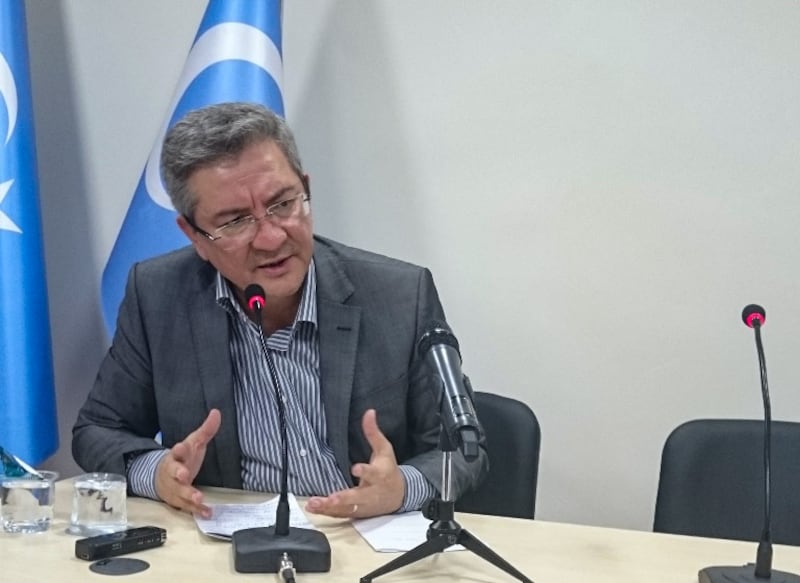Seeking to promote its narrative about the peace and prosperity enjoyed by majority-Muslim Uyghurs in the far-western region of Xinjiang, China earlier this month invited delegates from the 57-nation Organisation of Islamic Cooperation to visit and observe.
Comments made by some members of the delegation after the junket suggest that China’s plan to blunt international criticism of its treatment of Uyghurs may have worked.
The delegation traveled to Urumqi, Kashgar, Changi and the Kizilsu Kirgiz Autonomous Prefecture, where members saw an exhibit on counter-terrorism and de-radicalization and visited rural revitalization projects, Chinese foreign ministry spokesman Wang Wenbin told a news conference on Aug. 22.
The delegation also visited Uyghur families and religious figures and prayed with local Muslims at a mosque, he said.

Dya-Eddine Bamakhrama, head of the delegation and Djibouti’s permanent representative to the OIC, praised “the prosperity and development of China’s Xinjiang under good governance” during stops in Kashgar, Kizilsu Kirgiz Autonomous Prefecture and other places on Aug. 20, according to a Chinese state-run media report.
Syed Mohammad Fawad Sher, a Pakistani delegate, said the visit showed the “remarkable transformation” of Xinjiang, adding that it will “help to address the misconceptions attached with the region,” according to the Express Tribune, a Pakistani newspaper.
Another unnamed OIC member remarked on “the openness and inclusiveness of Xinjiang and the smiles on the faces of people of all ethnic groups.”
‘Violates own charter’
The comments appear to reflect that Muslim nations are increasingly embracing China’s narrative about the Uyghurs and other Turkic peoples in the Xinjiang Uyghur Autonomous Region.
The United Nations has documented serious rights abuses of Uyghurs, including arbitrary detention in “re-education” camps and prisons, intrusive surveillance, the destruction of religious and cultural sites and attempts to eradicate their language and culture. They have also been subjected to torture, forced sterilizations and forced labor, the U.N. has said.
Beijing has rejected the accusations, insisting it is running vocational training facilities in the region to counter extremism.
And Muslim nations refrain from speaking out about the treatment of fellow Mulims so as to not upset China, a major investor in developing nations, experts say.
The OIC has not taken any steps to look into abuses in Xinjiang, although its charter declares it seeks “to safeguard the rights, dignity and religious and cultural identity of Muslim communities and minorities in non-member states.”

Erkin Ekrem, associate professor of Chinese foreign policy at Hacettepe University in Ankara, said the OIC has a moral duty to express concerns about the suffering of Muslims around the world and offer support to the Uyghurs.
“Certain members of OIC countries support China for their geopolitical and economic interests,” he said. “The OIC’s support of China in this case violates its own charter and the core tenets of Islam.”
‘Economic coercion’
The ruling Chinese Communist Party, or CCP, has been influencing other countries, especially developing ones, to support its policies through investment and trade, said Teng Biao, a Chinese academic lawyer, human rights activist and visiting scholar at the University of Chicago.
All but three of the OIC’s members have signed a memorandum of understanding to join the Belt and Road Initiative, Chinese President’s Xi Jinping’s ambitious loan-and-infrastructure program that aims to connect Asia with Africa and Europe via land and sea networks.
“[M]any Islamic countries are completely under the pressure of the CCP and then help the Chinese government to speak about, approve or even praise the CCP’s genocidal policy in Xinjiang,” Teng said. “Behind this is actually economic coercion and political pressure.”
Also, many OIC states are authoritarian countries themselves, with poor human rights records, so they have refrained from criticizing Beijing, he said

The Chinese government also uses large-scale external propaganda and state-controlled media to create “false appearances,” such as during delegation visits to places like Xinjiang, which are carefully orchestrated, Teng said.
“It is obviously impossible for these so-called delegations to see the concentration camps and the miserable lives of the Uyghurs in Xinjiang,” he said.
“The government also buys some countries through economic aid, including canceling the debts of many countries,” Teng Biao said. “Therefore, the governments of these countries put some economic interests and political interests above their own religious culture and universal values.”
‘China’s lies’
The World Uyghur Congress and Campaign for Uyghurs – two Uyghur rights groups – condemned the visit and called on the OIC to uphold its moral values and principles, and collectively denounce the ongoing persecution of Uyghurs.
“Unfortunately, many countries in the Muslim world, especially in the Middle East, are very willing and ready to believe in China's lies about this tragedy, this human rights crisis, because they see China as an anti-Western power,” said Mustafa Akyol, senior fellow at the Cato’s Institute’s Center for Global Liberty and Prosperity.
Adrian Zenz, a researcher at the Washington.-based Victims of Communism Memorial Foundation and an expert on the Xinjiang region, harshly denounced the OIC’s visit to China.
“High-level OIC delegation visits Xinjiang, praises China’s policies,” he said on the social media platform X, formerly known as Twitter.
“The extent to which this Muslim organization kowtows to Beijing is truly remarkable. Do they really have that much to gain from whitewashing a genocide? What did Beijing offer them?”
This report was produced by Radio Free Asia (RFA), a news organization affiliated with BenarNews.
